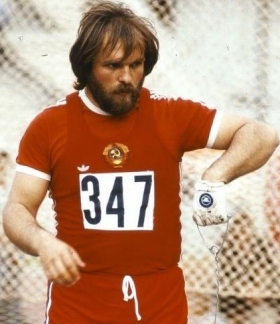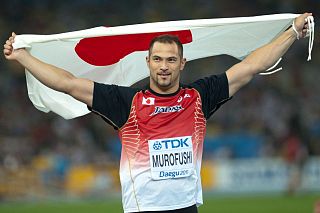
Yuriy Georgiyevich Sedykh was a track and field athlete who represented the Soviet Union from 1976 to 1991 in the hammer throw. He was a European, World and Olympic Champion, and holds the world record with a throw of 86.74 m in 1986.

The men's hammer throw competition at the 2004 Summer Olympics in Athens was held at the Olympic Stadium on 20–22 August. There were 35 competitors from 24 nations. After a series of doping-related disqualifications, the event was won by Koji Murofushi of Japan, the nation's first medal in the event. All distances are given in metres.

The Soviet Union (USSR) competed at the 1976 Summer Olympics in the city of Montreal, Quebec, Canada. 410 competitors, 285 men and 125 women, took part in 189 events in 22 sports. As the country hosted the next Olympics in Moscow, a live video feed from the city was shown at the closing ceremony.

The Soviet Union (USSR) was the host nation of the 1980 Summer Olympics in Moscow. 489 competitors, 340 men and 149 women, took part in 202 events in 23 sports.

The men's discus throw was one of four men's throwing events on the Athletics at the 1964 Summer Olympics program in Tokyo. It was held on 15 October 1964. 29 athletes from 21 nations entered, with 1 additional athlete not starting in the qualification round. The maximum number of athletes per nation had been set at 3 since the 1930 Olympic Congress. The event was won by Al Oerter of the United States, the nation's fourth consecutive and 11th overall victory in the men's discus throw. Oerter became the first man to win three medals in the event, all of them gold. He was only the second person to win three consecutive gold medals in any individual athletics event. It was the third of his four consecutive wins in the event. Ludvik Danek of Czechoslovakia took silver to break up the Americans' two-Games dominance of the discus podium; no non-American had won a medal since 1952. Dave Weill earned bronze to make this the fourth straight Games that the United States had won at least two medals in the event.

The men's hammer throw was one of four men's throwing events on the Athletics at the 1964 Summer Olympics program in Tokyo. It was held on 17 October and 18 October 1964, with the qualification on the first day and the final the next. 25 athletes from 14 nations entered, with 1 not starting in the qualification round. The maximum number of athletes per nation had been set at 3 since the 1930 Olympic Congress. The event was won by Romuald Klim of the Soviet Union, the nation's second consecutive victory in the men's hammer throw. Gyula Zsivótzky of Hungary repeated as silver medalist, the fifth man to win multiple medals in the event. Uwe Beyer took bronze, the first medal for the United Team of Germany and the first medal for any German hammer thrower since 1952.

The men's shot put at the Athens 2004 Summer Olympics was held on August 18, 2004, at the Ancient Olympia Stadium in Olympia, Greece. It was originally planned to hold the discus throw at this venue, but it was discovered that the field was insufficiently large to accommodate the range of modern discus throwers, and would have posed a danger to spectators. As such, it was decided instead to hold the shot put at the site, despite the fact that the shot put was not contested at the Ancient Olympic Games. All distances are given in metres. Thirty-nine athletes from 26 nations competed.

The men's hammer throw was an event at the 1996 Summer Olympics in Atlanta, Georgia. There were 37 competitors from 22 nations, with twelve athletes reaching the final. The maximum number of athletes per nation had been set at 3 since the 1930 Olympic Congress. The eight highest-ranked competitors after three rounds qualified for the final three throws to decide the medals. The qualification mark was set at 76.50 metres. The event was won by Balázs Kiss of Hungary, the nation's first victory in the men's hammer throw since 1968 and fourth overall. Lance Deal earned the United States' first medal in the event since 1956 with his silver. Oleksandr Krykun's bronze gave Ukraine a medal in its debut as an independent nation.

The men's hammer throw was an event at the 1992 Summer Olympics in Barcelona, Spain. There were 27 participating athletes from 19 nations. The maximum number of athletes per nation had been set at 3 since the 1930 Olympic Congress.

The men's hammer throw at the 1988 Summer Olympics in Seoul, South Korea had an entry list of 30 competitors from 16 nations, with two qualifying groups before the final (12) took place on Monday September 26, 1988. The maximum number of athletes per nation had been set at 3 since the 1930 Olympic Congress. In the final round the eight highest-ranked competitors after three rounds qualified for the final three throws to decide the medals. The event was won by Sergey Litvinov of the Soviet Union, the nation's sixth victory in the event. The Soviet team completed the medal sweep, with Yuriy Sedykh taking silver and Jüri Tamm bronze. It was the Soviets' third medal sweep in four Games, with only the boycotted 1984 Games missing. The 1988 team was the same as the 1980 squad, with Litvinov and Sedykh trading places. Litvinov and Tamm were the ninth and tenth men to earn multiple medals in the hammer throw, while Sedykh became the fourth to win three medals; his two golds and a silver trailed only John Flanagan's three gold medals in Olympic success.

The men's hammer throw was an event at the 1984 Summer Olympics in Los Angeles, California. There were 23 participating athletes from 13 nations. The maximum number of athletes per nation had been set at 3 since the 1930 Olympic Congress. The eight highest-ranked competitors after three rounds qualified for the final three throws to decide the medals. The qualification mark was set at 72.00 metres.

The men's hammer throw at the 2008 Summer Olympics took place on 15 August (qualifying) and 17 (final) at the Beijing National Stadium. There were 33 competitors from 26 nations. The event was won by Primož Kozmus of Slovenia, the nation's first medal in the event.

The men's hammer throw event at the 1980 Summer Olympics in Moscow, Soviet Union had an entry list of 17 competitors from 13 nations, with one qualifying group before the final (12) took place on 31 July 1980. Top 12 and ties and all those reaching 72.00 metres advanced to the final. The maximum number of athletes per nation had been set at 3 since the 1930 Olympic Congress. The event was won by Yuriy Sedykh of the Soviet Union, repeating as Olympic champion. He was the eighth man to win multiple medals in the event and third to have at least two gold medals. Just as in 1976, Sedykh led the Soviet team to a medal sweep, with Sergey Litvinov taking silver and Jüri Tamm bronze. The gold medal was the Soviet Union's third consecutive and fifth overall in the men's hammer throw, second all-time to the United States's seven.

The men's hammer throw at the 2000 Summer Olympics as part of the athletics program was held at the ANZ Stadium on Saturday, 23 September and Sunday, 24 September. There were 44 competitors from 24 nations. The event was won by Szymon Ziółkowski of Poland, the nation's first victory in the event and first medal of any color in the men's hammer throw since 1960. Silver went to Nicola Vizzoni, the first medal winner in the event for Italy. Igor Astapkovich, who had won a silver medal on the Unified Team in 1992, took bronze for the first medal credited to Belarus in the event. Astapkovich was the 11th man to win multiple medals in the hammer throw.

The men's hammer throw at the 1960 Summer Olympics took place on September 2 (qualifying) and September 3 (final) at the Stadio Olimpico. The qualifying standards for the 1960 event were 60 m. There were 28 competitors from 18 nations. The maximum number of athletes per nation had been set at 3 since the 1930 Olympic Congress. The event was won by Vasily Rudenkov of the Soviet Union, the nation's first victory in the event. Gyula Zsivótzky took silver, Hungary's fourth medal in the last four Games in the men's hammer throw. Tadeusz Rut's bronze was Poland's first medal in the event.

The men's hammer throw competition at the 2012 Summer Olympics in London, United Kingdom was held at the Olympic Stadium on 3–5 August. There were 41 competitors from 32 nations. The event was won by Krisztián Pars of Hungary, the nation's first victory in the men's hammer throw since 1996 and fifth overall. Primož Kozmus of Slovenia, the 2008 winner, took silver. Koji Murofushi of Japan, the 2004 winner, took bronze. Kozmus and Murofoshi were the 12th and 13th men to earn multiple medals in the hammer throw.

The men's hammer throw field event at the 1972 Summer Olympics took place on September 4 & 7. There were 31 competitors from 17 nations. The maximum number of athletes per nation had been set at 3 since the 1930 Olympic Congress. The event was won by Anatoliy Bondarchuk of the Soviet Union, the nation's third victory in the men's hammer throw. Fellow Soviet Vasiliy Khmelevskiy took bronze. Silver went to Jochen Sachse of East Germany, the nation's first medal in the event. The Soviet Union's medal streak in the event extended to five Games, while Hungary's ended after three Games.

The men's hammer throw event at the 1952 Summer Olympics took place on 24 July at the Helsinki Olympic Stadium. There were 33 competitors from 18 nations. The maximum number of athletes per nation had been set at 3 since the 1930 Olympic Congress. The event was won by József Csermák of Hungary, the nation's second consecutive victory in the event. Imre Németh, who had won four years earlier, took bronze; he was the fourth man to win multiple medals in the event. Silver went to Karl Storch of Germany.

The men's shot put competition at the 1968 Summer Olympics in Mexico City, Mexico took place on October 13–14. Nineteen athletes from 14 nations competed. The maximum number of athletes per nation had been set at 3 since the 1930 Olympic Congress. The event was wo by Randy Matson of the United States, the nation's sixth consecutive and 14th overall victory in the men's shot put. His teammate George Woods took silver, making 1968 the sixth straight Games the Americans had finished one-two. Matson was the seventh man to win two medals in the event ; Woods would become the eighth in 1972. Eduard Gushchin took bronze, the Soviet Union's first men's shot put medal.

The men's hammer throw competition at the 1968 Summer Olympics in Mexico City, Mexico took place on October 16–17. There were 22 competitors from 12 nations. The maximum number of athletes per nation had been set at 3 since the 1930 Olympic Congress. The event was won by Gyula Zsivótzky of Hungary, who had taken silver in both 1960 and 1964; he was the third man to win three medals in the hammer throw (after John Flanagan and Matt McGrath. Zsivótzky defeated defending champion Romuald Klim of the Soviet Union, who earned silver this time to become the sixth man to win multiple medals in the event. Bronze went to Lázár Lovász of Hungary.



















